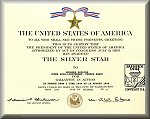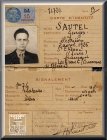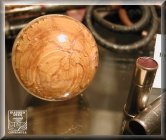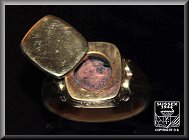|
VIS MISSION
How the mission
was prepared
(History of
Georges Soulier)
|

Georges Soulier
Click on ...
|

The Silver Star
awarded
to Georges Soulier
Click on ...
|
At the joint M.I. 6 and O.S.S school located in Saint Albans,
the constitution of the "pairs or teams of two" was often left with
the choice of the agents. Sympathy and the reciprocal regard, as
well as the progress report of the courses and training, carried the
decision.
"For this preparation, I was sent a few days later "to
have a refreshing break". It was the expression used to indicate the
very discrete place where we spent the last days before our
departure. It was a question of developing all the details
concerning the mission, and if necessary, of going back at it in
full physical form.
That occurred in a manor lost in nature. The place was
called Grendon. It was located at ten kilometres of Northampton. We
arrived at this house while crossing a large park maintained very
well. It was managed by the captain Alden of the O.S.S., and all the
personnel was composed of hand-picked American soldiers. Each one of
us had his luxuriously furnished room and there were several living
rooms and dining rooms. I remember that we ate there in a royal way.
It was not any more the English mode. For example with the breakfast
there were fruit juices, small sweetened thick pancakes, on which we
put liquid honey, very white English bread with peanut butter, jam,
cornflakes, small delicious sausages, without forgetting milk,
coffee, tea or chocolate, etc. The whole at will. And of the heavy
meals midday and evening.
The captain Alden had explained us that the number of
people passing in this house was to remain absolutely secret, as
well as for the supply office staff which supplied us. Also the
delivered quantities were always the same, and obviously quite
higher than the needs.
It is there that I knew that the place of my mission
would be Blois. This place was to be kept secret for all, and it was
forbidden to speak about it between comrades for obvious reasons
about safety. The team was composed of a chief of mission (the
observer) and radio operator in charge of the transmission of the
information and reception of the messages of the O.S.S. in London. I
was the radio operator. I learned that my fellow-member would be
Jourdet. He was a comrade who had followed the same training and
whom I knew already.
We were given a detailed map of the town of Blois. We
had to study it very seriously to know it by heart, and to be able
to move on the spot without the assistance of anybody, as if we live
there for a long time. We had to also learn the names and addresses
of the principal shopkeepers and other administrations. We underwent
several examinations during which we were requested information on
the people to be judicious known, or on the manner of going from a
place to another.
We learned that the code name of our mission would be
"VIS" and that our sector of work whose Blois would be the center,
extended from Vendôme in the North, Orleans in the East, Tours in
the West and Vierzon in the South. We received a set of very
detailed military maps of this zone. We were required to choose new
pseudonym for this mission, and I chose George Sautel with
information of marital status which was given to me, and which in
the event of control was unverifiable; registers of births,
marriages and deaths of the place where I was born, having been
destroyed or having been burned during the first part of the war.
.

Georges Soulier’s
forged identification card
Click on ...
A
few days later, I was given an identity card, established with the
name that I had chosen, by the Police Station of Blois. I received
also various sets of papers: food card from which I had to learn how
to use it, work permit, membership card of Inns of Youth,
certificate of residence, etc.
I also received all the material which I could need
during this mission. Among it, two receiving & transmitter radio
sets Mark 7 in their small red leather bags, one of them to be used
in the emergency shelter, an automatic gun Colt 45, and various
gadgets: a pen gas thrower 38 gauge to temporarily blind a police
officer a little too curious, a phosphorescent ball of the size of a
table tennis ball, to be placed close to an object to find quickly
in the night, such as the gun for example or to make night signals
on the ground of parachuting. There were also a flask with Gin or
another Whisky, a tiny metal round box containing pills to fight
against tiredness and sleep, a compass, a medical kit with morphine
syringe, two English "striker" grenades n° 69 made out of Bakelite,
and still much more other objects which I forgot " »
|

The
phosphorescent ball
and gas cartridges
Click on ...
|

Coded
message written
on self destructive paper
used during this mission
Click on ...
|
"Lastly, we carried with us a cyanide pill to be swallowed in the
event of arrest and tortures, to avoid speaking. Usually this pill
was placed in a gold ring, having a mobile kitten. This one hid a
small cavity of the size of the pill. Unfortunately for me, there
was no more ring when I received this pill, and they arrived only
after my departure. This fact I never had it! I must say besides
that at the time, it was the least of my concern! "

Gold signet ring hiding a cyanide pill
Click on ...
"From the financial point of view, we were at ease. We had received
for our expenses a sum of two hundred thousand French Francs (approximately
30 500 euros), what at the time represented an enormous sum of
money. In order to have an idea, a managing director of a company
used to earn a maximum of four to five thousand French Francs per
month (750 euros approximately), when he was well paid! Half of this
sum would be put in reserve in our emergency shelter.
In the last days before our departure, we had to choose
our civil clothing. They did not bear any mark, and it would thus
not have been possible to define their origin in the event of
control. I also received a Swiss watch of very great quality, but
without mark "
We learned that a team managed by certain "Pierre", was
to take delivery of us on the ground, and to lead us to a
provisional shelter where we would be in safety before our departure
for Blois. This Pierre was to also indicate the name of the person
to be contacted for our installation in this town. an agreed message
would be diffused by the radio of London, the famous B.B.C., in its
"private messages" heading to inform the committee of reception of
our arrival. Thirteen hours thirty: Here is London, here are your
personal messages:
.. “The typhoon will
take four crews”...
We repeat:
“The typhoon will take
four crews” twice.
This message would be repeated during the bulletins broadcasted at
nineteen hour thirty and twenty one hour thirty, Pierre was to make
all the necessary arrangements to receive us the same evening, and
in particular, to mark out the ground with light and to ensure the
security of the field with the assistance of resistant of the sector.
On the 30th of May 1944, in the morning we were informed that it
would be for this evening! In the afternoon we got dressed into
civil, and we only kept our weapons. All the remainder of our
clothing and our material was packed in containers to be parachuted
with us. Three other teams would be dropped on the same DZ as our
“Vis” team: "Madeleine" would work in the sector of Saint Germain,
"Marbot" in Versailles and "Cure" in Tours. The evening after the
dinner, we met with those who remained in England, to drink the
glass of the departure. We only drank Gin or Whisky, but in quantity.
Also we were warmed up at the end of this drinking party.
After saying goodbye, around 10.00 pm we got into cars
which took us along to the Harrington Airfield, not far from
Tempsford, one of the 8th Air Force bases. Two "B24 Liberators" of
the Carpetbaggers of the 801/492 Bombardment Group of the U.S.A.A.F.
were waiting for us. The "Liberator" is an enormous bomber with four
engines with eight crew members: pilot, copilot, navigator, bomber,
radio, dispatcher, turret gunner and mechanic. It should be noted
that these planed assigned to special operations were black painted
with anti-reflective coating for camouflage and protection against
the projectors of the FLAK.
Our containers were already loaded on board. We put on
several plates with foam, then we slipped on our overall camouflaged,
them our boots in fabric and finally the foam helmet to be used to
deaden the too brutal falls. Finally we put on our parachute. The
colonel came to tell us some words of encouragement. Four of us got
into each plane whose engines were already running. We sit down on
the floor, because there were neither seats, nor benches. The plane
took off in the night, it was very dark inside because there only
was a small night light. Outside, all also appeared quite black,
although it was the full moon, as for all parachutings. In the
interior, the euphoria of the departure was replaced by a complete
silence.
Quickly we were above the English Channel. The turret
gunners fired some gusts to check the correct operation of their
weapons. I felt a strong apprehension, initially caused by the jump
to carry out, apprehension which always was the same as it was for
the first time, in spite the number of jumps already done, but
especially for what we wiould find on the ground. Indeed it already
happened that the people in charge of the reception were stopped and
replaced by agents of Gestapo.
We flew since more than one half an hour, then suddenly the plane
was surrounded by gleams and was strongly shaken. The flight officer,
without any emotion, explained us that we just reached the French
coasts, and that we had to face the Anti-Aircraft Defense which shot
at us. Finally all again became quiet.
We spent a new hour without incident, then the
dispatcher who was in liaison with the pilot, asked us to get
prepared, because we would soon arrived. We hang up the hook of our
parachute to the steel wire rope running along the cabin and we
waited…… But nothing happened! After having carried out several
turns above the ground, the dispatcher informed us that the
committee of reception did not mark out the DZ (dropping zone) nor
sent the agreed signal. Consequently the dropping was cancelled and
we turned back towards England! A coward relief then replaced the
fear I had before. I thought that it was the same for my other
companions, because at once we all were more loquacious.
While passing above a city the dispatcher took large
packages surrounded of kraft paper and tied up. He sliced the
strings with his knife and dropped all these packages, still closed,
by the trap door. He explained us that they were anti-German
leaflets. The still tied up packages spent a certain time to open
while falling down quickly, so that the leaflets would only scatter
at low altitude above the houses. We landed at the base around 3 or
4 hours in the morning.
After a few hours of rest, at the end of the morning,
our American officers told us that we would again depart this
evening. Like the day before, we celabrated this new departure
before joining the planes. The flight occured without notorious
incident. Once again the dispatcher asked us to get prepared and we
waited. Once again, nothing occurred? There was still no signal on
the ground and we again returned to England.
The following day, it was June the 1st, we were kicked
up by our comrades remained on the spot. They made fun nicely of us,
saying that we were afraid to jump, or because it was to have free
farewell drinks and other jokes of the same kind. Almost immediately,
we were warned that we were again going to leave the same evening.
During the farewell celebration somebody said that finally it was
not unpleasant to start again every evening the same ceremonial, and
that we could still continue like that during further days.
Once again, we climbed into the same planes. We started
to know the procedure well. Just above the French coasts, as the
first time we were under the violent fire of the Anti-Aircraft
Defense but the plane was not hit. Little before the arrival on the
DZ, we saw great red gleams by a port-hole, rather far on our left.
We were explained that to make diversion on our flight, U.S aviation
was carrying out a bombardment of a railway center.
A little later on, once again we went through our jump
preparation. The dispatcher announced us that this time everything
was ok. The agreed signals of recognition were flashing; the
committee of reception was there. The trap door opened. The plane
did a first passage to drop our containers, then it returned to the
end of the field. My heart beating, I sat down at the edge of the
trap door. I could see the red light which lit up and I heard
somebody to shout loudly "Action station" then, the light went
green, a howl: "Go!! ".My mission started!
I jumped out in the space "
Then left to their destiny, each "Sussex" agent took part in a very
active way to inform the Allied Headquarters’ staff, moving with the
battle front, often even pulling back with the German troops.

|